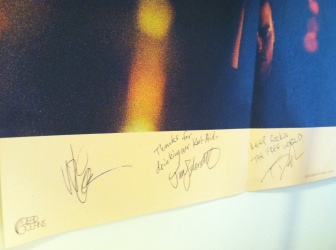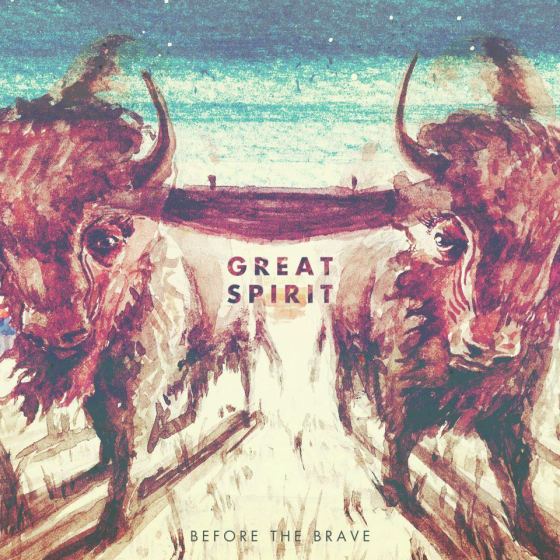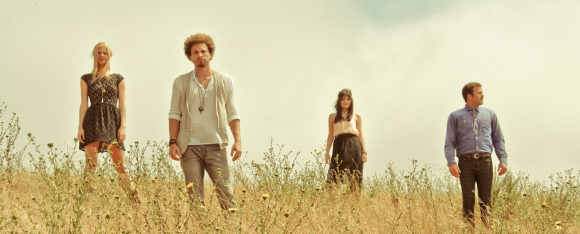Ian and I traded some emails back and forth with our thoughts on where music stands today that we decided to post on our respective blogs. It’s a little bit of a long read, but we wanted to start sharing our discussion as we hope to continue it and to touch on a number of things as they relate to music and otherwise. Feel to join to tweet your thoughts or post on Facebook.
Ian: I’ll start with a question: do we let our beliefs inform our musical selections?
I like listening to country. Some will thumb their noses at the genre and I have to acknowledge the personal preferences of listening. However, to me, modern country is probably the commercial forefront of pop/rock. Yet, I’m afraid to self-associate.
Country is the music of NASCAR, ‘Merica, and the Stars and Bars. Even if it’s a lot more a descendant of Jackson Browne and The Eagles than a regional genre, I don’t want to self-associate with the general backwardness that it sometimes it evokes.
Lots of people like “everything but country.” Is that strictly a statement on preference? I’m inclined to think not. Plenty of those people like Mumford and Sons. Mumford and Sons aren’t doing anything too different from what Eric Church or others are doing. Liking Mumford and Sons and letting others know is a much “safer” thing though.
I’d argue that country music is one of the most salient cultural examples of self-segregation.
I think that we are in a period of cultural segregation. For the past 30 years or so, we seen a number of trends–political, technological, cultural–that have delivered, re-established, or reinforced segmentation. While we eager to point of the advantages of globalization and the knowledge age that the internet has provided (look no further than the Arab Spring), we too often overlook the isolation and insulation that has occurred during the same time.
Your thoughts?
Adrienne: I think you are definitely onto something. I find myself incredibly cautious to associate myself with the genre of country music as well. So cautious in fact that I will find essentially any other word I can, often stringing them in superfluous combinations, to describe the genre of music I’m listening to so long as that word that makes me shudder, country, is not in play.
Why am I so much more comfortable associating with music termed “folk,” “folk-rock,” or “Americana” but not “country?” Although it is not clear to me why, there is undoubtedly a certain safety in attaching oneself to folk music or music with folk roots when in fact, more often than not, the roots are more obviously based in a rich tradition of country music.
I believe that there are numerous factors playing into our cultural acceptance of “folk” as opposed to “country,” but one of my stronger hunches has to do with perceived political associations. To the casual listener and observer, folk brings forth associations of the 1960s and 70s, of Woodstock, of “free love,” and forward liberal thinking. These associations are all in stark contrast to those brought up when one thinks casually about country music. Rather, country music is associated with stereotypes of the conservative South, with whining rednecks, dusty highways, and quite frankly a general backwardness. Although both of these sets of associations are stereotypes, it perhaps makes sense why so many would have a gut feeling of hesitation, one they could not truly put their finger on because it is based on a pervasive stereotype as “gut feelings” so often are. However, this does not make the gut feeling of disassociation any less powerful. In fact, it might end up making it more powerful because those feelings, those intuitions that we have that we cannot rationally justify are often the ones that persist the longest as we do not know how to even begin to address them. Thus, we take the easier way out, simply brushing issues of contention under the rug.
And now, tying back to your intriguing connection to cultural self-segregation, I do there is something of a paradox in the ways we engage with the internet. That we now dramatically have access to a seemingly infinite amount of knowledge through the internet does not necessarily mean that we know how, or even bother, to take advantage of this information.
I believe there is a common error in reasoning that access implies knowledge. Access to information, to statistics, to facts should in theory make us more worldly, more aware citizens of the world; however this is simply not the case. We choose our own exposures, our own facts we which to pay attention to; thus, just as before, the internet has made us no more intelligent or open-minded. In fact, if anything, I believe that the internet has made us slightly less open-minded. We play off the deceptive notion that because we have more “access” to an expansive amount of information that somehow, fueled by the forces of confirmation bias, the beliefs we still hold are somehow even more valid, thus making us even more resolute in our narrow-minded beliefs and even less likely to see other perspectives.
I have painted a rather bleak picture of cultural self-segregation fueled largely by a vicious cycle of confirmation biases. Is it possible then to ever overcome it or are we confined forever by the walls that we build ourselves? Does the stigma on the genre of country affect current bands, both up-and-coming and established, in the ways that they craft their music and present themselves to the public?
Ian: I’m not sure I’m the best one to answer a question on affecting the way bands craft their music–my musical talents peaked at my 8th grade piano recital or at least are limited to the occasional dabbling with Ableton–but from the media side, yes, it is definitely affecting the way artists and bands present themselves.
I would estimate less than 1 in every 100 submissions is self-identifying as country. At 1146 miles, we receive significantly more hip hop and remix submissions. In all honesty, jazz submissions probably outpace country submissions as well. I would theoretically be more inclined to post a country song, but the last time I can recall a country song on the blog is when I named Eli Young Band’s cover of “Even If It Breaks Your Heart” as one of my favorite songs of 2012. Even then, I could give myself an out because it’s a Will Hoge song and alternative country doesn’t necessarily have the same stigma (let’s call it the Kristofferson effect).
I’m inclined to believe that the blogosphere is not seen as conducive or friendly to country music as media from Nashville’s perspective. Blogs tend to take a more liberal tack and country as an industry is much more conservative. I’m sure there’s a blogger that is a closet Ted Nugent fan and there are certainly Music Row liberals, but I would bet those are the minorities in both cases. With that in mind, it’s easy to see how blogs start to fall more frequently on the folk side of the folk/country divide that you mentioned. It seems to be a more natural fit for a blog to post about folk, no fretting necessary.
If you’re a musician that is putting in the time, effort, and money–basically doing it all from booking your gigs to doing your own outreach, aren’t you going to frame your music in the way that is going to get the most exposure? There are a million and one music blogs that are looking to share their favorite new music. If they are more inclined to share folk music, are you the female Mumford and Sons or the next Dixie Chicks? More than likely it will be like the former and thus, the semantics start to guide the presentation of music.
The division between folk and country is more than just a semantic difference though. I think you are exactly right that it is guided by the associations we make. We’re in a time, as you point out, limiting our exposure to sources that confirm our biases. In some senses, our generation has every right to be disillusioned just like the 60′s or the Lost Generation before them. The federal government can barely function. The Euro zone is teetering. Manufacturing–creating things of actual value–is gone and it’s not coming back. Folk’s anti-establishment heritage plays well in today’s environment.
Someone, and I unfortunately can’t remember who, called this the “quick buck” economy. Doing only what’s necessary to make as much as possible then moving on. I see this in pop music. Pushing out songs that appeal to the lowest common denominator and then repeating the process. Mainstream country does this. It is no less factory-produced than Rihanna’s latest song (see how easily Taylor Swift transitioned to pure pop). Folk still has that Dylan-esque aura about it. Country has long since lost the Hank Williams associations. That allows us to argue that folk still holds something that country doesn’t–that it still organic, natural, and authentic (even if Phillip Phillips’s label cadre attempts to destroy this).
I see the rise of Mumford and Sons, Of Monsters and Men, and The Lumineers as a pushback for authenticity. Less autotune and more instrumentalists. More foot tapping and less drum machine. Music that makes us feel. There’s something to be said about the genuine joy on Neyla Pekarek’s face when she is stomping along to “Ho Hey.” I can’t help but feel happy every time. It’s almost an unconscious resistance to the limits of the machine, the internet, and by extension, the internet age and our self-imposed insulation. It’s like music can be the Julia to our Winston.
I wonder if contemporary times are building those walls that you mentioned or trying to knock them? Are they doing both simultaneously?
Adrienne: I hope my answer doesn’t come across as a cop-out response. Nonetheless, I am inclined to say that I believe contemporary times are doing both the building and breaking of those walls simultaneously. I even like to go further and add that I believe that these undeniably contradictory processes are happening not only around but concurrently within many bands.
Take The Lumineers that you mentioned earlier as an example. I could not agree with you more that artists like Wesley, Jeremiah, and Neyla present a strong force of fresh air and authenticity to the music scene. Genuine, unadorned lyrics and foot stomping are universally contagious and, as The Lumineers’ sell-out concerts, Grammy nods, and chart-topping “Ho Hey” have demonstrated, even those who listen exclusively to the Top 40 will have what I feel is a visceral response to their music. However, there is one crucially important clause necessary to fulfill in order to have this effect on mainstream listeners: the music had to have been fed to them by some outside source.
And this is where I struggle, where I believe that the walls that I just moments ago described as being knocked down I feel now can also be described as simultaneously being built up, almost as quickly as they were torn down. Why did The Lumineers suddenly become so famous? The answer is simple. Two words: ho hey. I have no intention in the slightest of discrediting The Lumineers’ talent or authenticity; however, I can name many other bands that are doing exactly what The Lumineers are doing, producing the same kind of genuine, foot tapping, authentic music and yet they are still in obscurity. The real difference between these bands lies in the fact that The Lumineers’ music was fed to its listeners on a continuous three minute thirty second loop through radio, commercials, etc. in ways that most bands are not lucky enough to be.
So then, the lasting impact of mainstream listener exposure to bands akin to The Lumineers can still be viewed as a positive one, I still am not denying that. Metaphorical “walls” are being torn down, substituting authenticity for bricks instead of “quick buck” conformity. However, I am arguing that the process it took to get to this stage, namely that the music had to be fed to listeners, feels extremely cheap to me and reveals the ways in which modes of media still build confining walls.
Media giants promoted what was catchy, what would appeal to, like you said, the least common denominator and that was “Ho Hey.” If the way we consume media were to be truly revolutionized, I believe that “Ho Hey” would not have been the only track fed on loop to listeners. In fact, there would be no single track fed on loop, there would be no loop at all. Singles, although they promote exposure for a band, ultimately encourage a cheap and confining relationship between artist and listener, stemming to something much akin to the confirmation biases that I spoke of earlier. Listeners believe that they know an artist, love an artist, because they love their catchy single that has been played every hour on our local top 40 radio station and thus have little incentive to move beyond their satisfied contentment.
Perhaps the counter-argument could be that singles capture the average listener’s interest and prompt them to investigate the band and the other tracks of their album further and more deeply, and this may be the case in some situations. Nonetheless, as a whole I believe that they way the average listener is fed music by industry today prompts an attitude of passive digestion, of “wall building” self-segregation even when one adds a “new” band to their list.
I find this resulting passive attitude towards music especially problematic for many reasons, the least of which being its less obvious but incredibly damaging effects on listeners’ attitudes towards paying for music and artists’ rights. If listeners simply passively consume the music fed to them, how can we be surprised that listeners overwhelmingly fail to make the active assertion to support music through monetary avenues when mindless free streaming services and illegal download buttons are so readily available? This, however, leads into a tangent even further from the tangent I am already on. Thus, I’ll leave this issue of artists rights largely unfleshed for another day and discussion.
Now, my tangent upon tangent aside, I suppose the real question coming off of my Lumineers example that would need to be addressed to get back at the original question about how artists frame themselves would be, how did The Lumineers frame themselves, if at all?
Or, do artists after a certain point of notoriety not even get to have any say in framing themselves, or if they are framed at all, because bloggers/interviewers/etc. take the reins and do the confining, the framing, and facilitate the listeners’ self-segregation for them? I do not think it is productive to take a finger-pointing approach, some would argue no blame even need be attributed, however I do think that confronting and seeking to unravel these and related issues are a productive thing and crucial to understand.
One last thing, I thoroughly loved your 1984 reference. A lot.
Ian: Two terms really jumped out to me: satisfied contentment and passive digestion.
I think those two things are go hand-in-hand and are the core of the sheep-like mentality that you have more or less described, Adrienne. I’m not sure it’s limited to just music, as I tend to think that it reflects the social constructs of our society.
Regardless, it seems especially apparent with music. Lots of people like to know about the next big thing and musical culture is less stagnant than politics, economics, or even other aspects of pop culture like movies so there are more next big things. Yet, most people don’t take an active approach to satisfying the desire, to discover the new artist. It’s a situation where most people don’t feel any conviction to really escape it. They accept being force fed. Thus, the artists that the general public hears are the ones that are let through the gates of the walls we mentioned. The gatekeepers are still those with money and megaphones and legitimacy by fiat like the big 3 record labels. There is certainly tons of good music from those labels but even within their rosters (let alone independent labels), artists get overshadowed by the acts that are let through the gates.
Correct me if you think differently, but with art (and particularly in this case, music as art), I want to see the “best” be the most successful. “Best” is completely subjective, of course, but it’s hard to say those most successful now would be without the artificial manipulation of exposure by the gatekeepers. And that can rub a lot of people the wrong way. The system, self-insulating and limited, cheapens the artistic aspects of music. With that said, I don’t think many artists consciously choose to accept this or game the system.
Perhaps I am projecting myself a bit, but I think contradictory processes are at work in everything, in all of us. To use a slightly different animal analogy than sheep, a mockingbird sings a beautiful mating song to create another generation but at the same time, also alerts their predator to their location. I think artists balance artistic pursuits with their goals, which are often times to play music for a living. The way they operate is within the general constructs of society and the music industry. They don’t necessarily sacrifice their artistic integrity but they might be willing to change how they present themselves like we mentioned earlier.
I’d like to pivot here to how the music industry is changing because of the internet and back to the self-segregation we mentioned near the beginning. The internet is this great democratization and yet insulating thing. To go back to country discussion, I don’t follow any country blogs. I could be exposed to a bunch of great independent country artists, yet I don’t make any effort to do so. I approach it somewhat passively and I really only have myself to blame.
The internet seems to have aided in widening the breadth of exposure but narrowing the depth of exploration. For every person that hears “Ho Hey” and checks out the rest of The Lumineers catalogue, there is another that sings along to “Ho Hey” and then the next song on the top 40 station and doesn’t worry about it. I’m not saying that’s necessarily a “bad” or “wrong” thing, but it certainly devalues the artistic value and limits the paid downloads, the merchandise purchases, or going to concerts like you said. It’s the musical equivalent of bandwagon fans. I’m not sure there’s a way to provide greater appeal to fans that buy the hit song for $0.99 but couldn’t name a second song off of the EP or album.
Alas, it’s the way the industry has evolved for better or for worse. And it’s like we’re left to coax a song out of a mockingbird.










